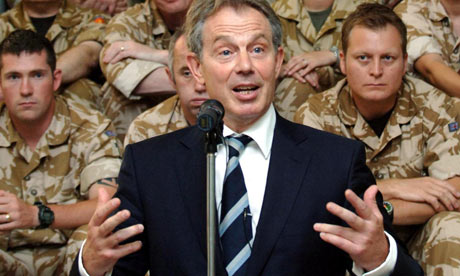Foreign Office official's evidence the day before attorney general Lord Goldsmith appears will increase pressure on Tony Blair Tony Blair speaking to British soldiers in Iraq. The Foreign Office's former chief legal adviser will tell the Chilcot inquiry this week that Blair's deicison to take Britain to war was illegal. Photograph: Stefan Rousseau/PA Tony Blair's decision to take Britain to war in Iraq was illegal, the Foreign Office's former chief legal adviser will tell the Chilcot inquiry this week. The Observer has been told that Sir Michael Wood, who was the FO's most senior lawyer, is ready to reveal that, in the run-up to war, he was of the opinion that the conflict would have been unlawful without a second UN resolution. This will provide an explosive backdrop to the former prime minister's appearance before the inquiry on Friday. The evidence from Wood, who will appear before the committee on Tuesday, will provide the firmest proof to date of the bitter wranglings that divided the government in the countdown to war. His testimony will come the day before the appearance of Lord Goldsmith, the former attorney general, who is said to have dropped his legal objections days before the invasion, following intense pressure from Blair and his closest advisers, and the US authorities. A senior legal figure close to the discussions at the time told theObserver: "The advice that was given consistently in the Foreign Office [by Wood] was that war would be unlawful without a second resolution. The important thing is that Foreign Office advice was given consistently in one way, and then the attorney general, right at the end, gave advice to the contrary. That is what will come out." It is also believed that the legal advice from Wood, who left the Foreign Office in 2006 and is now a barrister in private chambers in London, could be published for the first time by the inquiry. The revelation is certain to inflame the already febrile atmosphere among the relatives of those killed in Iraq. More than 40 will sit in on the inquiry during Blair's appearance on Friday. Last night there were signs that the families may stage some form of symbolic protest when the former PM takes the stage. They have written to the inquiry chairman, Sir John Chilcot, asking for a short private session with Blair in what one relative described as an opportunity to bring "closure". Reg Keys, who stood against Blair in the 2005 election after his son Tom, a military policeman, was killed in Majar al-Kabir in 2003, said he had contacted the inquiry chairman asking for families to be offered "one final chance to share their concerns". Blair will take his place amid intense security, with mass protests expected in Westminster. Sources close to Scotland Yard said Blair's appearance had been a major factor behind the government's decision to raise the terror threat level from "substantial" to "severe". Intelligence operatives had picked up "domestic chatter" that had given them reason to believe his appearance before the inquiry required a higher state of alert. "We are gearing up for Blair," said the source." His appearance will be crucial in determining the process by which the country went to war. He will face intense questioning on the way patchy intelligence evidence of Saddam Hussein's weapons programme in 2002 was translated into firm assertions that the threat was "growing" and "beyond doubt". Tough questioning is expected, particularly from Sir Roderic Lyne, a former diplomat who is emerging as the most tenacious of Chilcot's inquisitors. The panel are also certain to question Blair on what he decided at key meetings with President George Bush in the run-up to war and whether more could have been done to equip soldiers for the conflict, in which 179 British service personnel have died. But the question of the legality of war threatens to be the most damaging. Goldsmith is likely to be pressed on whether he was pushed into changing his mind by Blair and senior US officials. At the time, arguments raged on whether UN resolution 1441, which related to Iraq's ceasefire obligations from the first Gulf war, gave legal cover for military action. Because the consensus among lawyers was that it did not, desperate – and ultimately fruitless – attempts, led by Britain and the US, were mounted to win support for a second resolution that would have made the case watertight. Whitehall sources have revealed that Goldsmith and Wood had worked closely on the issue of the legality of war. But in the days before invasion, Goldsmith abruptly changed his position, declaring that it would in fact be legal. "There was agreement. [Goldsmith] then went to talk to the Americans, the US State Department. And the Americans were very clear what they wanted and what they thought, and that is what changed his mind," said an FO source. Wood's deputy at the time, former Foreign Office lawyer Elizabeth Wilmshurst, who resigned two days before the war because she believed the invasion was a "crime of aggression", will appear at the inquiry after Wood on Tuesday.Iraq war was illegal, top lawyer will tell Chilcot inquiry

Sunday, 24 January 2010
Posted by
Britannia Radio
at
07:39
![]()





















